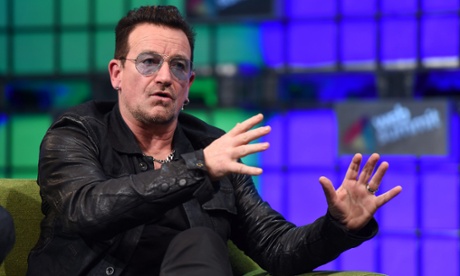
U2 frontman Bono has praised streaming music services as a way for musicians to get their music heard, and defended Spotify from criticism of the amount it pays out to artists and songwriters.
“The real enemy is not between digital downloads or streaming, the real enemy, the real fight is between opacity and transparency. The music business has historically involved itself in quite considerable deceit,” he said, speaking at the Web Summit conference in Dublin.
“But if we change that bit, and people can actually see how many times they’re being played, where they’re being played, get access to information on the people who are listening to them, get paid direct debit... I think those payments will add up to something, as the world gets more transparent.”
Bono went on to address artists’ criticism of Spotify in particular. “When people pick on Spotify: Spotify are giving up 70% of all their revenues to rights owners. It’s just that people don’t know where the money is because the record labels haven’t been transparent,” he said.
“That hasn’t been the demand: that will be the demand... That’s the thing to look for: transparency or opacity. For this new model to be successful and to take root, there has to be some kind of fairness... fair models of distribution. And I think when that happens, the music business will be a rising tide that lifts all boats.”
Bono defended U2’s recent album giveaway through Apple’s iTunes store, which caused controversy when iPhone and iPad owners found it automatically downloaded to their devices.
“We got a lot of people who were uninterested in U2 to be mad with U2. And I would call that an improvement in the relationship!” he said.
“And we were paid. No one values music more than the members of U2. To us music is a sacrament, it’s a sacred thing. I think artists should be paid way more than they are. But the greatest way you serve your songs is to get them heard.”
Later in his on-stage interview, he returned to the theme. “We always wanted our music to be heard, and the idea that we could work for years and years on what we think are the most personal songs we have ever written – you have to become very raw to write like that - and then the idea that they might not be heard is terrifying. So we were just thrilled that we got this chance,” he said.
“About 100 million people checked us out, one or two or three tracks, but about 30 million people liked the whole album. That took us 30 years with The Joshua Tree. So we did in three weeks with Songs of Innocence what took us 30 years with The Joshua Tree.”
Bono also claimed that while digital music disruption is worrying many artists, it will ultimately be good for young bands starting out.
“I’m already paid too much, I’m a spoiled rock star! I’m the wrong spokesperson for this, but i have to tell you if I were starting a band now, aged 17 or 18, I would be very excited,” he said.
“I would be as excited as I was when we formed U2 when we were 17 / 18 years old. Though it is clear that there are some traumas as we move from physical to digital and 20th century to 21st century, and the people paying the highest price for those traumas are songwriters rather than performers, I still think forming a band is so exciting.”
U2 may have signed an exclusive deal with Apple’s iTunes to distribute their latest album, Songs of Innocence, as a download, but Bono said streaming services are also a positive step forward for artists.
“I see streaming services as uite exciting ways to get to people. In the end, that’s what we want for U2 songs,” he said.
“I don’t see songs as like our children, I see songs as like our parents: they tell you how to dress, how to behave, what time to get home at, and the only thing they don’t like is to be ignored. So anything that gets your song out there is a good thing.”
“I think the remunerative bit of this has yet to be figured out,” he continued. “It’s an experimental period. Let’s experiment. Let’s see what works.”
Bono went on to compare artists’ situation now with the days long before recorded music, when their main source of income might be travelling to play for “the lord of the manor”.
“I prefer it when we are in charge of our own destiny. What I would like to see is a station where tech companies cross-fertilise with cultural companies, and I think our voices will then be naturally more heard, more understood and therefore more valuable,” he said.
“We are slightly slipping back: musicians are losing that firepower that they had. We must be careful that we don’t underestimate our value. We don’t have to play for the lord of the manor. The lord of the manor can come and see us, and pay in like everybody else.”
Bono talked about his work with Apple on “new formats for music” which he had alluded to in interviews earlier in the year, adding animation and interactivity to album artwork.
He suggested that people might think of these formats as “more valuable than a simple MP3 file” and added “ we’re working with the company, if we get there we get there, but they’re letting us into the lab.”
• Adele’s manager: ‘Streaming’s the future, whether people like it or not’

